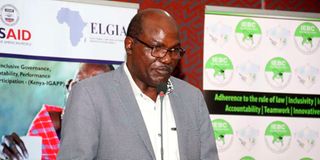Premium
IEBC challenges media to help in ensuring a free and fair poll

IEBC Chairperson Wafula during the IEBC pre-conference forum on The Role of Media and Opinion Polls in Shaping the Electoral Process in the 2022 General Election at KICC, Nairobi on July 10, 2022. Residents of Kisii have accused the commission of bias in recruitment of poll officials.
What you need to know:
- The IEBC will this week release guidelines on results transmission.
- IEBC chairperson Wafula Chebukati said the media will be given a chance to report live every process of the coming election to ensure transparency.
- IEBC chief executive officer Marjan Hussein challenged the pollsters and the media to be free, fair and independent.
The electoral commission has challenged the media to deploy their personnel across all the 46,232 polling stations to help in ensuring a free, fair and credible August 9 election.
The Independent Electoral and Boundaries Commission (IEBC) said they will this week release guidelines on results transmission.
Speaking during a pre-national election conference with the media and pollsters yesterday in Nairobi, IEBC chairperson Wafula Chebukati said the media will be given a chance to report live every process of the coming election to ensure transparency.
“It is our wish that the media is present in all the polling stations and tallying centres so that we walk this journey together. We would like to have 46,000 media persons reporting from all the polling stations. That is what we want to see as a commission,” said Mr Chebukati.
“Let us work together to ensure that the election is transparent in that people vote, the votes are counted and people know the results and people go back to their workstations the following day,” he added.
Media engagement
Consequently, the commission is ready to engage the media right from the polling stations up to the national tallying centre during the coming polls.
The IEBC boss, nonetheless, urged the media to remain professional in their line of duty as Kenyans take seriously every report disseminated by the various outlets.
“Media are our ears and eyes in as far as management of the elections is concerned. We cannot do it on our own as a commission. Let us work together and ensure that the election becomes a transparent process. Media has that role and can make it happen,” he said.
He, however, raised concerns that the electoral agency has only received 4,068 applications for accreditation from the media, out of which 4,024 have been processed.
Mr Chebukati said that 2,000 badges have already been printed and will be distributed starting this week with the remaining batch a work in progress.
Pollsters warned
For his part, IEBC chief executive officer Marjan Hussein Marjan said that opinion polls and the media are conjoined twins where the former provide a great source of information for the media while the media serve as the channel on which the poll reports get to the public.
However, he warned that the relationship could pose a threat to democracy if there is a misrepresentation of facts and distortion of the news.
Mr Marjan, therefore, challenged the pollsters and the media to be free, fair and independent as opinion polls influence how people view election outcomes.
“It should be known to everyone that fake news spreads like wildfire. Fake news can easily spark conflicts and, therefore, we expect the pollsters and the media to interrogate their news before publishing,” said Mr Marjan.
Dr Bossman Asare, the deputy chairman of the Electoral Commission of Ghana, said the media has a role in results management and transmission and in their case, the results of both the electoral commission and the media tallied.
“We forged a proper working relationship with the media as a critical player having a lot of engagements and training to understand the electoral process better,” he said.
Electoral Commission of South Africa vice-chairperson Janet Love urged the media to strive to make the electoral process free, fair and transparent by working with other stakeholders like observer groups.
She also brought to the fore the challenges posed by social media, urging the media to endeavour to raise awareness about the electoral processes and to also fight misinformation and disinformation.
Ambassador Ndiyoi Muliwana, a commissioner at Zambia’s electoral body, said they were forced to set up a team to deal with misinformation and disinformation on social media.
Infotrak boss Angela Ambitho said: “We adhere to professional tenets that guide us on what we are supposed to do as pollsters.”
Kenya Union of Journalists secretary-general Eric Oduor said the media is well prepared to cover the coming elections, while Media Council of Kenya’s Victor Bwire said they are not worried about election preparedness by the media.




